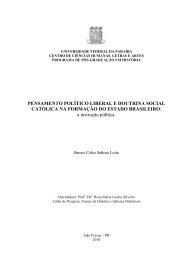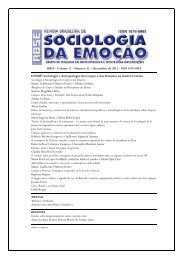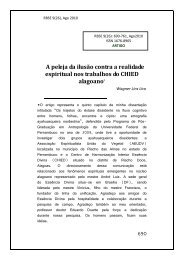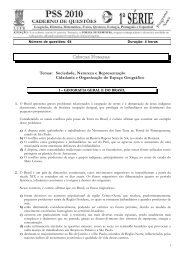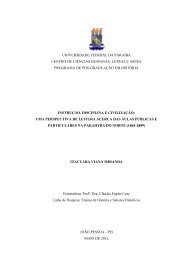abril de 2004 - CCHLA - Universidade Federal da ParaÃba
abril de 2004 - CCHLA - Universidade Federal da ParaÃba
abril de 2004 - CCHLA - Universidade Federal da ParaÃba
You also want an ePaper? Increase the reach of your titles
YUMPU automatically turns print PDFs into web optimized ePapers that Google loves.
Generated by Foxit PDF Creator © Foxit Softwarehttp://www.foxitsoftware.com For evaluation only.This is an important issue; we cannot afford just toshrug it off. Perhaps it is the price one has to pay for theadvancement of un<strong>de</strong>rstanding. But there us a furtherreason that is less obvious. It is possible that theambiguities of the word love are <strong>de</strong>fenses against feelingsof separation and alienation, that the way that the i<strong>de</strong>a oflove evokes positive feelings of awe and mystery is also a<strong>de</strong>fense against these painful feelings.I suspect that my colleagues in the belle-lettreswould carry this complaint quite a bit further than I have.They quote D. H. Lawrence’s passage to me, where heridicules the way that emotion is often represented in theform of a stereotype:We see love like a wooly lamb…, We see hate like adog chained to a kennel. We see fear like a shiveringmonkey. We see anger like a bull with a ring through itsnose, and greed like a pig… (Lawrence 1968, p. 756)My colleagues use this passage to reject anyattempt to explicitly <strong>de</strong>fine emotions. But that would be tomisconstrue Lawrence’s argument, which concerns theproblem of learning to feel. Poetry, the novel, and in<strong>de</strong>e<strong>da</strong>ll art, use ambiguity to surprise us into connecting withour hid<strong>de</strong>n feelings. Lawrence proposes reading novels asone example of how we might educate or at least feel ourfeelings: "[The rea<strong>de</strong>r should] not listen to the di<strong>da</strong>cticstatements of the author, but to the low, calling cries ofthe characters, as they wan<strong>de</strong>r in the <strong>da</strong>rk woods of their<strong>de</strong>stiny" (ibid, p. 760).He is not con<strong>de</strong>mning all di<strong>da</strong>ctic statements, butonly those in novels, which of course are no use for therea<strong>de</strong>r who wants to feel emotions. In this paper, mypurpose is not to help the rea<strong>de</strong>r feel emotion, but ratherto un<strong>de</strong>rstand them.The Vernacular Meaning of ShameThe word for shame provi<strong>de</strong>s a contrastingexample. Just as English <strong>de</strong>fines love enormously broadly,current usage <strong>de</strong>fines shame extremely narrowly, as acrisis emotion of disgrace that is conscious and painful.There is no room in the trope for what may be the mostprevalent type of shame, that which is unacknowledged,and on many occasions, outsi<strong>de</strong> of awareness. Responses119



